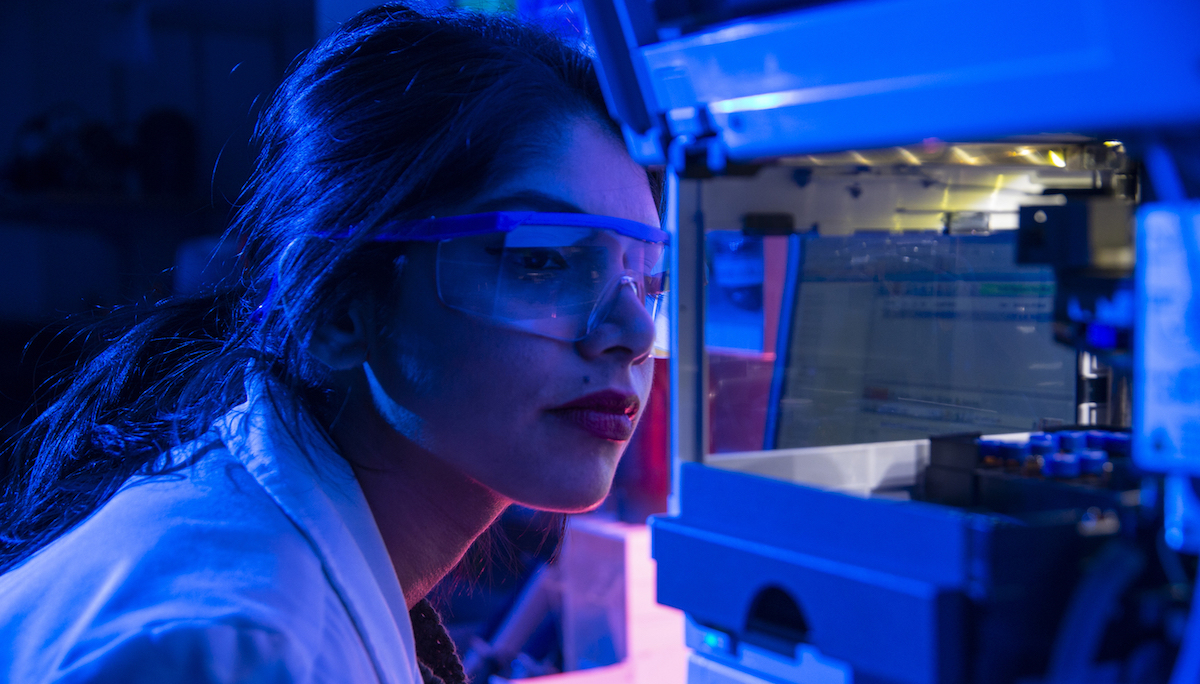
The Department of Chemistry and Biochemistry offers M.S., certificate, and Ph.D. degree programs in chemistry. Current research programs by department faculty are in the broadly defined areas of organic, medicinal and biological chemistry, biochemistry, biophysical chemistry, biomedical and materials sciences. Our faculty are leading the way towards the discovery of novel diagnostics and therapeutics for diverse diseases like cancer, infection, and neurodegenerative diseases. We value and celebrate diversity, race, ethnicity, culture, gender, sexual orientation, and unique differences among our students and faculty. Our graduate students are encouraged to excel in their graduate studies, to enhance their passion for science and research and to contribute to both the scientific community and society.
In addition to the University's general graduate admission requirements, the typical prerequisite to graduate studies in the Department of Chemistry and Biochemistry is the Bachelor of Science degree in chemistry or its equivalent. Students must have achieved a minimum 3.0 GPA in chemistry or chemistry focused degree, and scores of at least 150 (verbal) and 152 (quantitative) on the Graduate Record Exam.
The Chemistry Ph.D. Program is a multidisciplinary doctoral program in the Charles E. Schmidt College of Science at Florida Atlantic University. The Ph.D. program allows students to pursue a research program in most disciplines of chemistry. Our graduates go on to outstanding careers as researchers.
Students undergo rigorous training and have an opportunity to develop cross-disciplinary skills. Students take at least 80 credits of coursework which includes three core courses: Bionanalytical Methods (a two-part course), Synthesis and Characterization, Kinetics and Energetics (9 credits for the three courses), plus a nonthesis seminar (1 credit) and Introduction to Chemical Research (1 credit). The graduate electives (9 credits) may be selected from graduate-level courses offered in the Department of Chemistry and Biochemistry or other departments in the Charles E. Schmidt College of Science/Biomedical Science. The remaining credit hours (dissertation credits, minimum 25) are research-intensive. While the student's dissertation research may be highly focused in one of the sub-disciplines, the program curriculum provides a context for viewing this research in light of its relationship to other levels of organization and processes. The curriculum will be individually tailored to each student's research interests.
Chemistry Ph.D. Degree Policies and Procedures
This thesis program is designed for students whose career aspirations include securing industrial positions that demand technical mastery. Graduates of this program are exceptionally well-prepared for both high-impact roles in the industry and further academic pursuits in doctoral programs. Students take a minimum of 30 credits, which includes four core courses (9 credits): Bioanalytical Methods (2), Current Topics in Bioanalysis (1), Synthesis and Characterization (3), and Kinetics and Energetics (3). Additional requirements include a non-thesis seminar (1) and Introduction to Chemical Research (1). The graduate electives (9 credits) may be selected from graduate-level courses offered in the Department of Chemistry and Biochemistry or other departments in the Charles E. Schmidt College of Science/Biomedical Science. For the remaining credit hours, students conduct independent research under the supervision of a graduate faculty member, culminating in a thesis.
Chemistry M.S. Degree Policies and Procedures
This non-thesis program is designed for students whose career goals include industrial positions or further professional studies. Students completing this program are also well-positioned for further study in a doctoral program. Students take a minimum of 30 credits of coursework, which includes four core courses (9 credits): Bioanalytical Methods (2), Current Topics in Bioanalysis (1), Synthesis and Characterization (3), and Kinetics and Energetics (3). Additional requirements include a non-thesis seminar (1) and Introduction to Chemical Research (1). The graduate electives (19 credits) may be selected from graduate-level courses offered in the Department of Chemistry and Biochemistry or other departments in the Charles E. Schmidt College of Science/Biomedical Science.
The PREPChem program is crafted for college graduates with a bachelor's degree who aspire to elevate their knowledge and research skills for a thriving career in the chemical industry. This program offers a unique blend of traditional graduate classes in chemistry (9 credits) and cutting-edge courses in artificial intelligence (AI) (6 credits). AI is revolutionizing the field of chemistry by automating complex tasks, analyzing vast datasets, and accelerating drug discovery processes, making it an indispensable tool in modern chemical research and industry practices. All required graduate classes are provided through the Chemistry Department, while Data Science and AI courses are available through the College of Science or the College of Engineering and Computer Science. Upon completion of the 15-credit program, students will earn a postbaccalaureate certificate. Additionally, for those considering further academic pursuits at FAU, these credits can be seamlessly transferred toward an M.S. or Ph.D. program in Chemistry upon admission.
Mare Cudic, Ph.D.
mcudic@fau.edu
Professor and Director of Graduate Programs